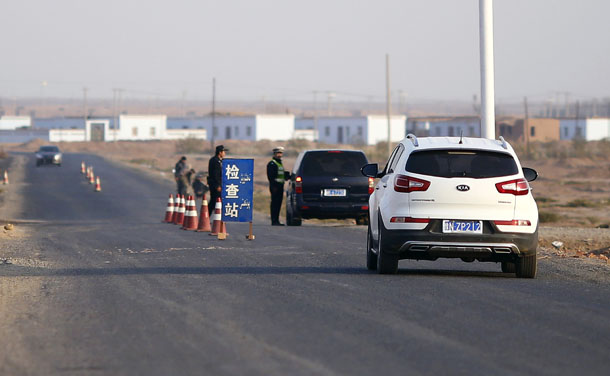BEIJING — Police have taken away an outspoken scholar of China’s Turkic Uighur ethnic minority and raided his home, seizing computers, cellphones and even his students’ thesis manuscripts, his wife said Thursday.
About 30 police officers raided economics professor Ilham Tohti’s home in Beijing in a six-hour operation Wednesday afternoon after taking away the academic, his wife Guzaili Nu’er said in a phone interview.
It was the most serious of recent actions by Chinese authorities in apparent retaliation against the scholar, who is arguably the most famous mainland-based critic of the ruling Communist Party’s restrictive policies in Xinjiang in western China.
China has tightened control over the restive region, which has been rocked by a series of riots and attacks on police and other symbols of Chinese power over the past year. State media reported earlier this month that President Xi Jinping has ordered authorities to refocus their efforts on “maintaining social stability” in Xinjiang.
Guzaili Nu’er said that Ilham Tohti and his two sons were at home while she was at work when police arrived. She rushed home but her husband had already been taken away.
Beijing police did not immediately respond to a faxed request for comment. Foreign Ministry spokesman Hong Lei said at a regular briefing that Ilham Tohti “is suspected of violating the law and committing a crime” and that police have placed him under criminal detention.
Calls to the scholar’s mobile phone failed to connect. The overseas-based website he runs, Uighurbiz.net, was also down.
US State Department spokeswoman Jen Psaki said in a statement that the United States was deeply concerned about the reports that Ilham Tohti had been taken away, and called on the Chinese authorities to account for his whereabouts.
The statement said the detention “appears to be part of a disturbing pattern of arrests and detentions of public interest lawyers, Internet activists, journalists, religious leaders and others who peacefully challenge official Chinese policies and actions.”
Ilham Tohti has been barred from traveling and placed under house arrest numerous times in the wake of deadly ethnic rioting in the capital of the Uighur ethnic homeland of Xinjiang in 2009 that sparked a nationwide crackdown on Uighur activists.
He has not joined calls for Xinjiang’s independence but his outspokenness on problems with China’s ethnic policies has made him a target of security forces. He has criticized the authoritarian government’s heavy-handed handling of recent unrest, saying China’s stifling security presence, widespread discrimination and restrictions on religious and social practices have fanned ethnic discord in Xinjiang.
“The Uighur people have become outsiders in the development of their own homeland and survival,” Ilham Tohti wrote in a post on his mobile social media account Wednesday morning. “It is here that the people’s anger begins to grow. Uighur people need an avenue to express their aspirations and protect their rights.”
The scholar’s wife said she feared the authorities meant to take stronger measures against him this time. Although he has been taken away for questioning before, she said, he usually returns late at night.
“This time it’s different. They sent so many security officers, including police from Xinjiang, Beijing and the nearby police station. This time it is more serious,” she said.
Guzaili Nu’er said police seized four computers, several mobile phones and Ilham Tohti’s students’ thesis papers, and refused to answer her questions about where he had been taken to, or why. On Thursday afternoon, two men in plainclothes were stationed in the hallway outside the apartment and they tried to block reporters from entering the apartment.
Atilamu, 22, who was one of two undergraduate students of Ilham Tohti’s at the apartment Thursday, said that police took them away for several hours of questioning Wednesday before releasing them near midnight, and that their cellphones, computers and class notes also were seized. The students said they knew of at least about a half-dozen other Uighur students who were similarly questioned.
Associated Press reporter Isolda Morillo contributed to this report.















